Anatomy of an NBA champion: Which playoff teams fit the statistical profile?
What does a champion look like?
Anyone familiar with the pantheon of NBA champions knows that certain teams have dominated - only 12 franchises have won the last 40 titles. But what do those champions have in common? Do they provide a statistical profile we can use to learn about this year's playoffs?
After identifying a group of common statistical characteristics last year, the Bucks, Warriors, and Raptors came out as the most likely champions, with the Trail Blazers being identified as a sleeper contender. As it turned out, the Raptors took out the Bucks in the Eastern Conference finals and defeated the decimated Warriors for the championship, while the Blazers made a surprise run to the West finals.
When we're looking for statistical similarities among championship teams to help us evaluate this year's postseason field, we'll use the last 15 seasons. The NBA's current 30-team, six-division scheduling format has been in place since 2004-05. The league had already adopted rules that prioritized offense by eliminating hand-checking and illegal defenses. And it's also recent enough to account for the modern importance of 3-point shooting.
Let's dig into the numbers that link these NBA champions and see what they say about this year's playoff teams.
Wins
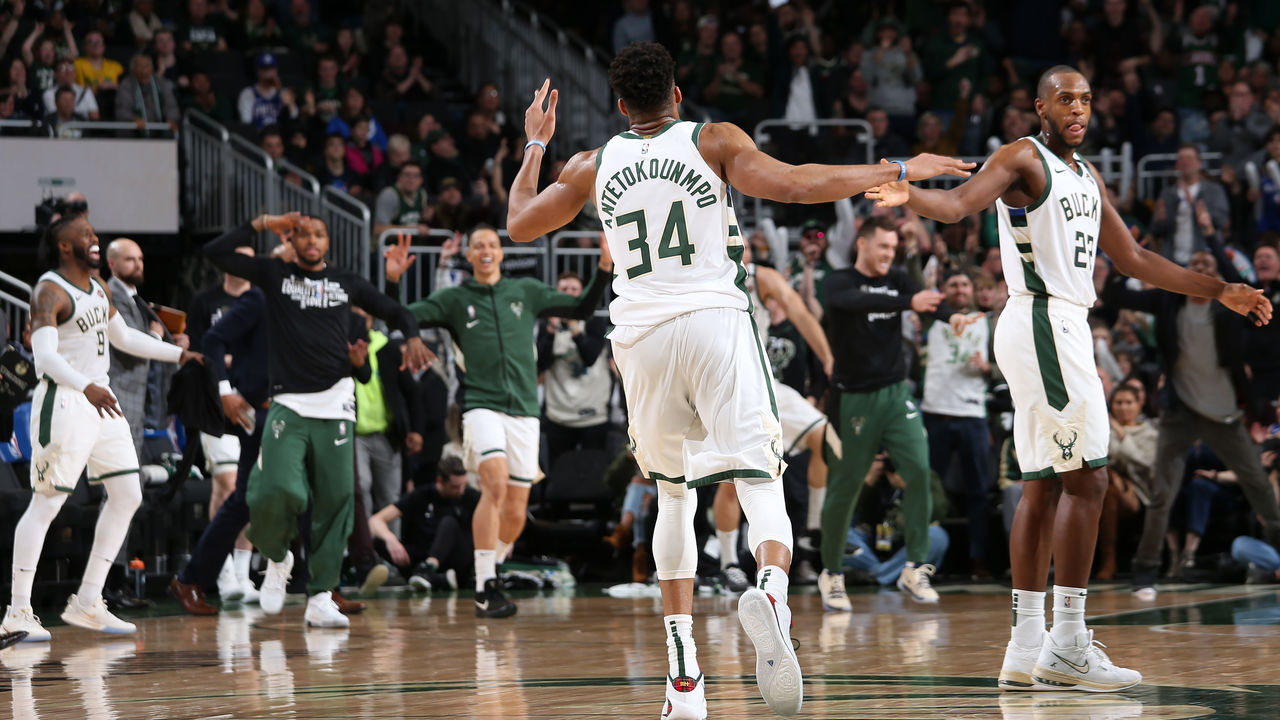
| Year | Champion | Win% | League rank |
|---|---|---|---|
| 2005 | Spurs | .720 | 3rd |
| 2006 | Heat | .634 | 5th |
| 2007 | Spurs | .707 | 3rd |
| 2008 | Celtics | .805 | 1st |
| 2009 | Lakers | .793 | 2nd |
| 2010 | Lakers | .695 | 3rd |
| 2011 | Mavericks | .695 | 5th |
| 2012* | Heat | .697 | 4th |
| 2013 | Heat | .805 | 1st |
| 2014 | Spurs | .756 | 1st |
| 2015 | Warriors | .817 | 1st |
| 2016 | Cavaliers | .695 | 3rd |
| 2017 | Warriors | .817 | 1st |
| 2018 | Warriors | .707 | 3rd |
| 2019 | Raptors | .707 | 2nd |
Modern champions have compiled a minimum win percentage of .634 - the equivalent of 52 wins in 82 games - and a top-five overall record during the regular season.
Even that might be a bit conservative, as the winning percentage outlier, the 2005-06 Heat, were on a 55-win pace (41-20) after Pat Riley took over coaching duties from Stan Van Gundy, and a 58-win pace (42-17) with Shaquille O'Neal in the lineup after the big man missed 18 of 20 games to start the season. You'll also notice that the last seven champs finished with top-three records.
Who fits the bill this year? Bucks, Raptors, Lakers, Clippers, Celtics
Who doesn't measure up? Nuggets, Rockets, Thunder, Heat, Pacers, Jazz, 76ers, Mavericks, Magic, Nets, Trail Blazers
Nearest outlier: Nuggets
Denver (.630) finished one win shy of cracking the .634 threshold and placed sixth overall rather than in the top five. It's not a stretch to say the Nuggets would've made up the difference had rookie Michael Porter Jr. been healthy and at his best all season.
Point differential
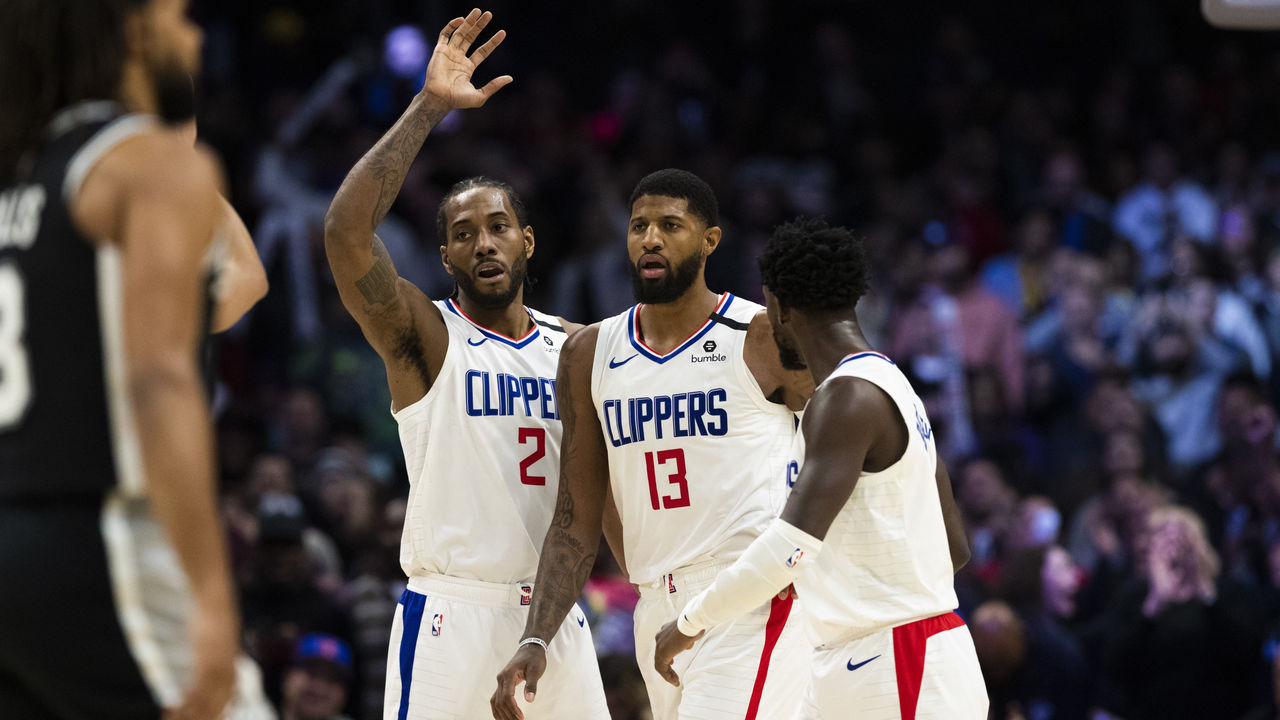
| Year | Champion | Differential | Rank | Net Rtg | Rank |
|---|---|---|---|---|---|
| 2005 | Spurs | +7.8 | 1st | +8.2 | 1st |
| 2006 | Heat | +3.9 | 5th | +4.1 | 6th |
| 2007 | Spurs | +8.4 | 1st | +9.2 | 1st |
| 2008 | Celtics | +10.3 | 1st | +10.8 | 1st |
| 2009 | Lakers | +7.7 | 2nd | +7.9 | 2nd |
| 2010 | Lakers | +4.7 | 6th | +4.9 | 5th |
| 2011 | Mavericks | +4.2 | 8th | +4.4 | 8th |
| 2012* | Heat | +6.0 | 4th | +6.4 | 3rd |
| 2013 | Heat | +7.9 | 2nd | +8.2 | 2nd |
| 2014 | Spurs | +7.7 | 1st | +8.2 | 1st |
| 2015 | Warriors | +10.1 | 1st | +10.0 | 1st |
| 2016 | Cavaliers | +6.0 | 4th | +6.3 | 4th |
| 2017 | Warriors | +11.6 | 1st | +11.3 | 1st |
| 2018 | Warriors | +6.0 | 3rd | +5.9 | 3rd |
| 2019 | Raptors | +6.1 | 3rd | +5.8 | 3rd |
An NBA champion needs to boast a top-eight scoring differential and top-eight net rating per 100 possessions. Specifically, the previous champions have outscored opponents during the regular season by at least 3.9 points per 48 minutes or 4.1 points per 100 possessions. The 2011 Mavs are an obvious outlier here, and a top-five differential might be the more accurate cutoff.
Who fits the bill? Bucks, Raptors, Lakers, Clippers, Celtics, Mavericks
Who doesn't measure up? Nuggets, Thunder, Pacers, Rockets, Heat, Jazz, 76ers, Nets, Magic, Trail Blazers
Potential outlier: Thunder
Forget playing at a championship level; Oklahoma City played at an all-time level with its best lineup on the floor this season. The five-man combination of Chris Paul, Shai Gilgeous-Alexander, Dennis Schroder, Danilo Gallinari, and Steven Adams outscored opponents by 29.9 points per 100 possessions in 177 minutes together - a full seven points better than the NBA's next-best lineup. The Thunder have the top-performing quintet among 218 lineups that logged at least 100 minutes together over the last two seasons.
Offense

| Year | Champion | Off. Rtg rank | eFG% rank | 3P% rank |
|---|---|---|---|---|
| 2005 | Spurs | 8th | 6th | 8th |
| 2006 | Heat | 7th | 2nd | 20th |
| 2007 | Spurs | 5th | 2nd | 4th |
| 2008 | Celtics | 9th | 5th | 5th |
| 2009 | Lakers | 3rd | 6th | 19th |
| 2010 | Lakers | 11th | 15th | 23rd |
| 2011 | Mavericks | 8th | 3rd | 11th |
| 2012* | Heat | 8th | 5th | 9th |
| 2013 | Heat | 2nd | 1st | 2nd |
| 2014 | Spurs | 6th | 2nd | 1st |
| 2015 | Warriors | 2nd | 1st | 1st |
| 2016 | Cavaliers | 3rd | 4th | 7th |
| 2017 | Warriors | 1st | 1st | 3rd |
| 2018 | Warriors | 3rd | 1st | 1st |
| 2019 | Raptors | 5th | 3rd | 6th |
Notwithstanding the 2009-10 Lakers, a top-nine offensive rating (points per 100 possessions), a top-six effective field-goal percentage, and a top-20 3-point percentage are all requirements for a championship offense. Dig deeper and you'll find that as NBA offenses have shifted to emphasize the 3-point shot, the last eight champions all finished in the top nine in 3-point shooting.
However, in the interest of consistency, we'll include the 2010 Lakers and say that the 2020 champion only requires a top-11 offensive rating, a top-15 eFG%, and a top-23 3-point percentage.
Those very modest cutoffs don't really discriminate.
Who fits the bill? Bucks, Lakers, Clippers, Nuggets, Heat, Jazz, Mavericks,
Trail Blazers
Who doesn't measure up? Raptors, Celtics, Thunder, Pacers, Rockets, 76ers, Nets, Magic
Potential outliers: Rockets, Celtics, Lakers
Houston missed the 3-point accuracy cutoff by 0.3 percentage points, while Boston missed the eFG% cutoff by only 0.1 percentage points. Meanwhile, the Lakers barely qualified, as the last 15 champions have all had top-23 3-point shooting teams, and Los Angeles ranked 22nd in that category this season.
Defense
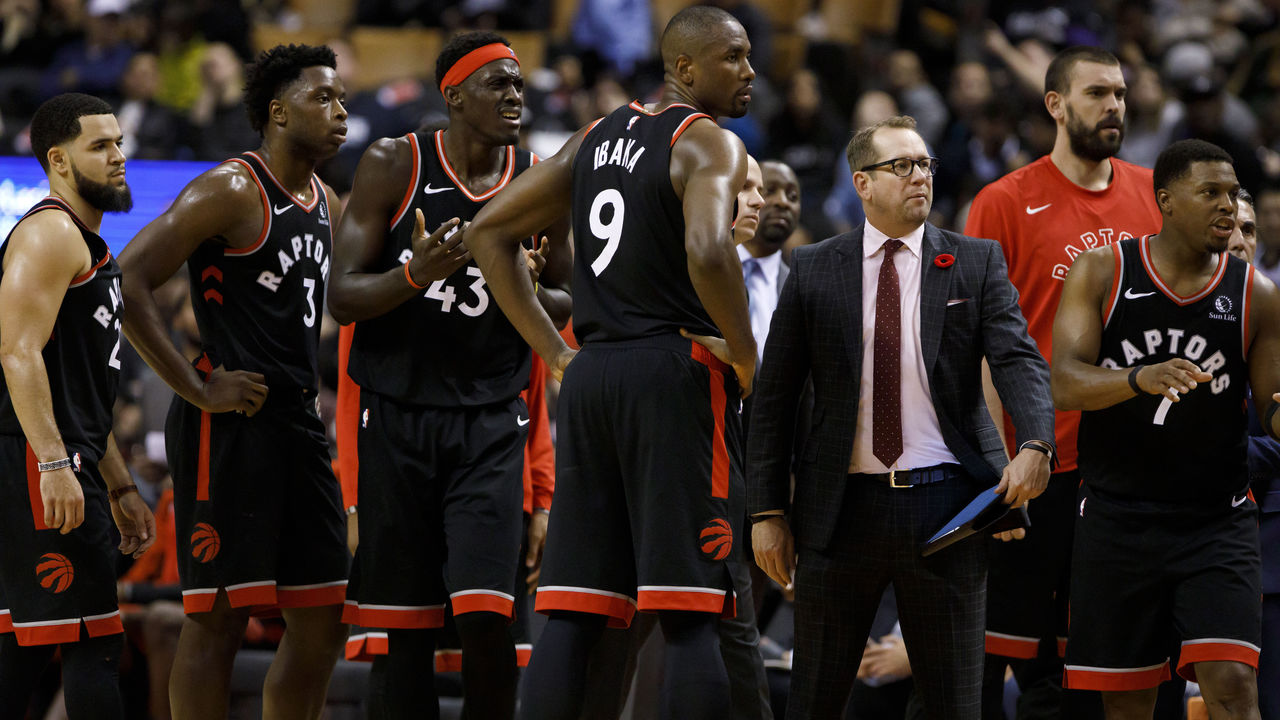
| Year | Champion | Def. Rtg rank | Opp. eFG% rank |
|---|---|---|---|
| 2005 | Spurs | 1st | 1st |
| 2006 | Heat | 10th | 11th |
| 2007 | Spurs | 2nd | 2nd |
| 2008 | Celtics | 1st | 1st |
| 2009 | Lakers | 6th | 8th |
| 2010 | Lakers | 4th | 7th |
| 2011 | Mavericks | 8th | 9th |
| 2012* | Heat | 4th | 9th |
| 2013 | Heat | 9th | 9th |
| 2014 | Spurs | 3rd | 4th |
| 2015 | Warriors | 1st | 1st |
| 2016 | Cavaliers | 10th | 13th |
| 2017 | Warriors | 2nd | 1st |
| 2018 | Warriors | 11th | 5th |
| 2019 | Raptors | 5th | 4th |
Although offense gets all the attention, every champion in our sample finished in the top 11 on the defensive end, with at least a top-13 mark in opponents' effective field-goal percentage. Also, note that 12 of the last 13 champions finished in the top eight in limiting opponents' effective field-goal percentage.
Who fits the bill? Bucks, Raptors, Lakers, Clippers, Celtics, Pacers, Thunder, 76ers, Nets
Who doesn't measure up? Nuggets, Rockets, Heat, Jazz, Mavericks, Magic, Trail Blazers
Potential outliers: Heat, Jazz
Miami and Utah both finished in the top 13 in opponents' eFG%, but their overall defensive rating was 0.1 points per 100 possessions worse than the top-11 mark needed to qualify.
Star talent

| Year | Champion | Best player rank | All-Stars |
|---|---|---|---|
| 2005 | Spurs | 4th (Tim Duncan) | 2 |
| 2006 | Heat | 4th (Dwyane Wade) | 2 |
| 2007 | Spurs | 3rd (Duncan) | 2 |
| 2008 | Celtics | 4th (Kevin Garnett) | 3 |
| 2009 | Lakers | 4th (Kobe Bryant) | 2 |
| 2010 | Lakers | 6th (Pau Gasol) | 2 |
| 2011 | Mavericks | 9th (Dirk Nowitzki) | 1 |
| 2012* | Heat | 1st (LeBron James) | 3 |
| 2013 | Heat | 1st (James) | 3 |
| 2014 | Spurs | 14th (Duncan) | 1 |
| 2015 | Warriors | 1st (Stephen Curry) | 2 |
| 2016 | Cavaliers | 3rd (James) | 1 |
| 2017 | Warriors | 5th (Curry) | 4 |
| 2018 | Warriors | 8th (Curry) | 4 |
| 2019 | Raptors | 15th (Kawhi Leonard) | 2 |
The postseason, let alone the Finals, is about transcendent talent. Depth can carry you to the playoffs and an All-Star can perhaps drag you into the second or third round. But if you want to compete in June, you need a Hall of Fame-type player. There's a reason every Finals for the last 29 years has featured at least one of LeBron James, Kobe Bryant, Shaquille O'Neal, Tim Duncan, Michael Jordan, Hakeem Olajuwon, or Steph Curry.
There's obviously no way to quantify with 100% accuracy where players rank individually in the NBA, but one fun tool is using data that determines how stars stack up based on their average rank across a plethora of catch-all stats. Andy Bailey made this measure famous on Basketball Twitter, and a similar model can now be found at B-Ball Index. According to that data, each of the last 15 champions has had a player rank in the top 15 during the regular season.
You'll also notice every champion featured at least one All-Star, with 12 of the last 15 teams employing more than one.
All 15 champions featured at least one All-NBA selection (nine of 15 had multiple players on the year-end list), and 13 of the last 15 champions boasted at least one All-Defensive team selection. But those awards won't be handed out for weeks, so we can't use them to filter this year's squads.
Let's look for teams with a top-15 player this season, according to the average of those aforementioned stats.
Who fits the bill? Bucks, Raptors, Lakers, Clippers, Celtics, Nuggets, Thunder, Rockets, Heat, Jazz, 76ers, Mavericks, Blazers
Who doesn't measure up? Pacers, Nets, Magic
Potential outlier: Pacers
It's incredibly unlikely, but if Victor Oladipo can find his pre-injury form - or if T.J. Warren is suddenly the player he was in the seeding games on a full-time basis - Indiana would have the type of player good enough to be in the top-15 conversation.
Home vs. road
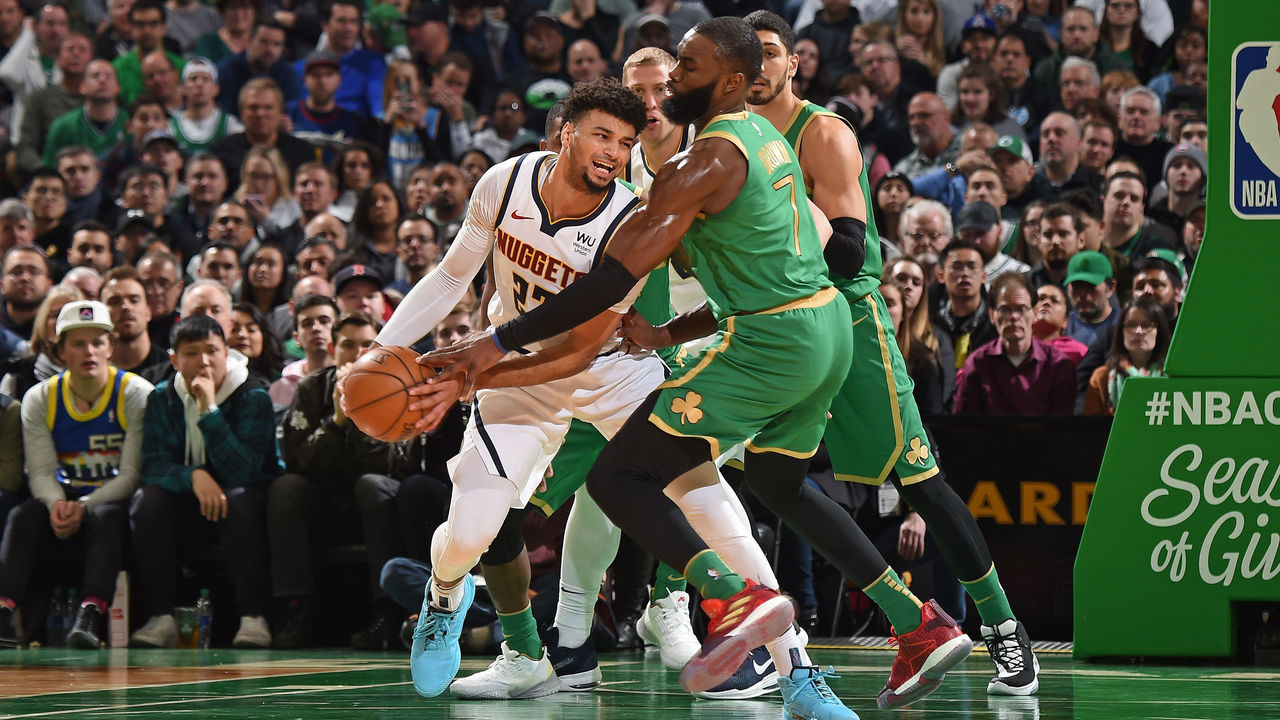
Given there's no real home-court advantage in the bubble, this category obviously takes on far less meaning than it did in previous years. Still, a team that excels no matter where it plays is usually a pretty good indicator of a contender, so let's look at the home/road splits of recent champions and then compare that to the splits 2019-20 teams posted up until the March 11 shutdown.
| Year | Champion | Home W% | Road W% |
|---|---|---|---|
| 2005 | Spurs | .927 | .512 |
| 2006 | Heat | .756 | .512 |
| 2007 | Spurs | .756 | .659 |
| 2008 | Celtics | .854 | .756 |
| 2009 | Lakers | .878 | .707 |
| 2010 | Lakers | .829 | .561 |
| 2011 | Mavericks | .707 | .683 |
| 2012* | Heat | .848 | .545 |
| 2013 | Heat | .902 | .707 |
| 2014 | Spurs | .780 | .732 |
| 2015 | Warriors | .951 | .683 |
| 2016 | Cavaliers | .805 | .585 |
| 2017 | Warriors | .878 | .756 |
| 2018 | Warriors | .707 | .707 |
| 2019 | Raptors | .780 | .634 |
We're looking for teams that posted a minimum home win percentage of .707 (equivalent to a 29-12 home record in a full season) while also recording a winning record on the road.
Who fits the bill? Bucks, Raptors, Lakers, Clippers, Celtics, Nuggets
Who doesn't measure up? Pacers, Heat, 76ers, Thunder, Rockets, Jazz, Mavericks, Magic, Nets, Trail Blazers
Potential outlier: Rockets
Had Houston won just one more home game this season, the Rockets would've met the home winning percentage required to qualify. Perhaps they would've boosted their .688 mark up to the necessary .707 had they played all nine home games lost when the season was postponed.
If you're wondering why some other metrics were left out of this research, I discovered that assist metrics, rebound rates, turnover measures, free-throw frequency, and opponent 3-point percentages didn't produce trends as consistently as the statistics cited above. The championship teams we examined often finished in the bottom third in at least one of those categories.
Who's left standing?
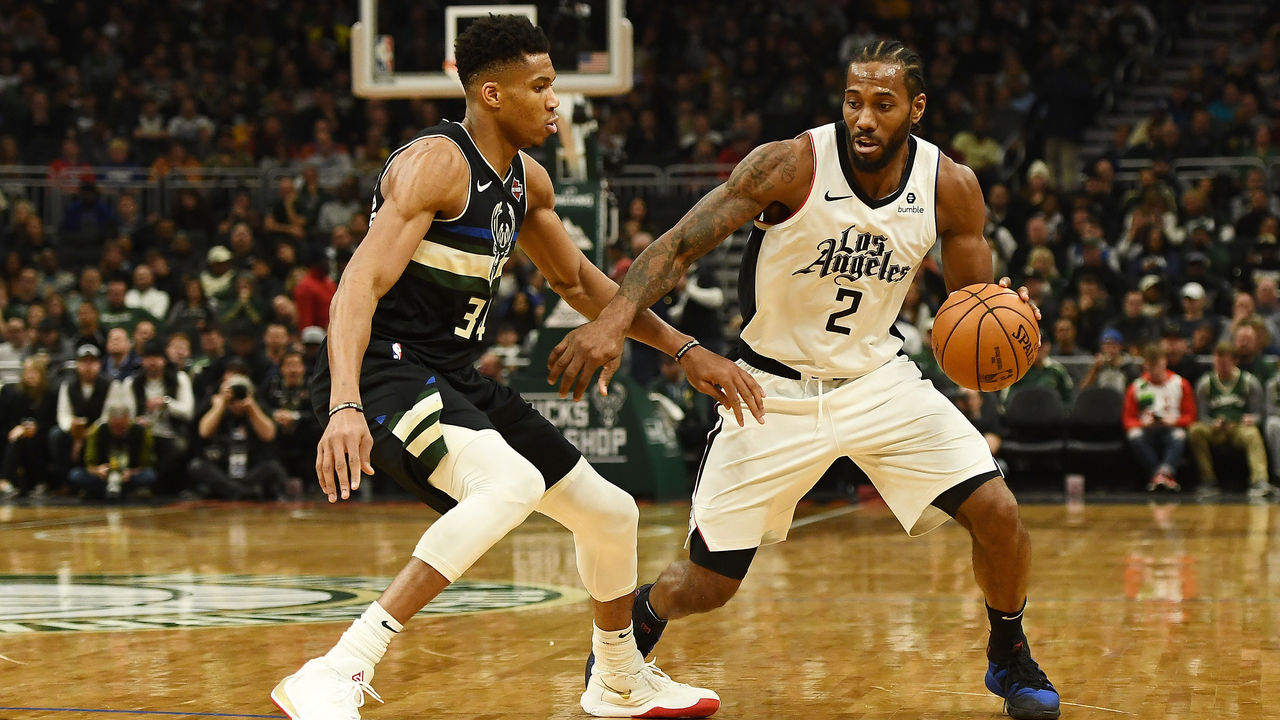
Only three teams managed to check every box. Unsurprisingly, the Bucks, Lakers, and Clippers enter the postseason as the clear-cut favorites when considering the statistical profile of an NBA champion, though the Lakers' shooting woes could prove to be a fatal flaw.
Just missed the cut: Raptors, Celtics
Both Toronto and Boston missed checking every box after falling short on the offensive end.
The Raptors finished 13th in offensive rating when no recent champion finished worse than 11th, and their half-court efficiency is perhaps the biggest postseason question mark looming over the defending champs.
The Celtics boasted an elite overall offense (fourth ranked) but fell short in effective field-goal percentage, which indicates that a fair share of their offensive success can be tied to offensive rebounding and free throws (as well as taking care of the ball). Both of those tend to dry up in the postseason when defenses and officials place extra value on every single possession. So Boston's inability to score efficiently on the first shot of possessions is concerning.
Just happy to be here: Magic
Orlando's the only playoff team without a single championship indicator, but it's worth noting that the only box Houston checked was "star talent." James Harden's brilliance is the only thing ensuring the Rockets enter the postseason with a better championship profile than the Magic.
Joseph Casciaro is theScore's senior basketball writer.